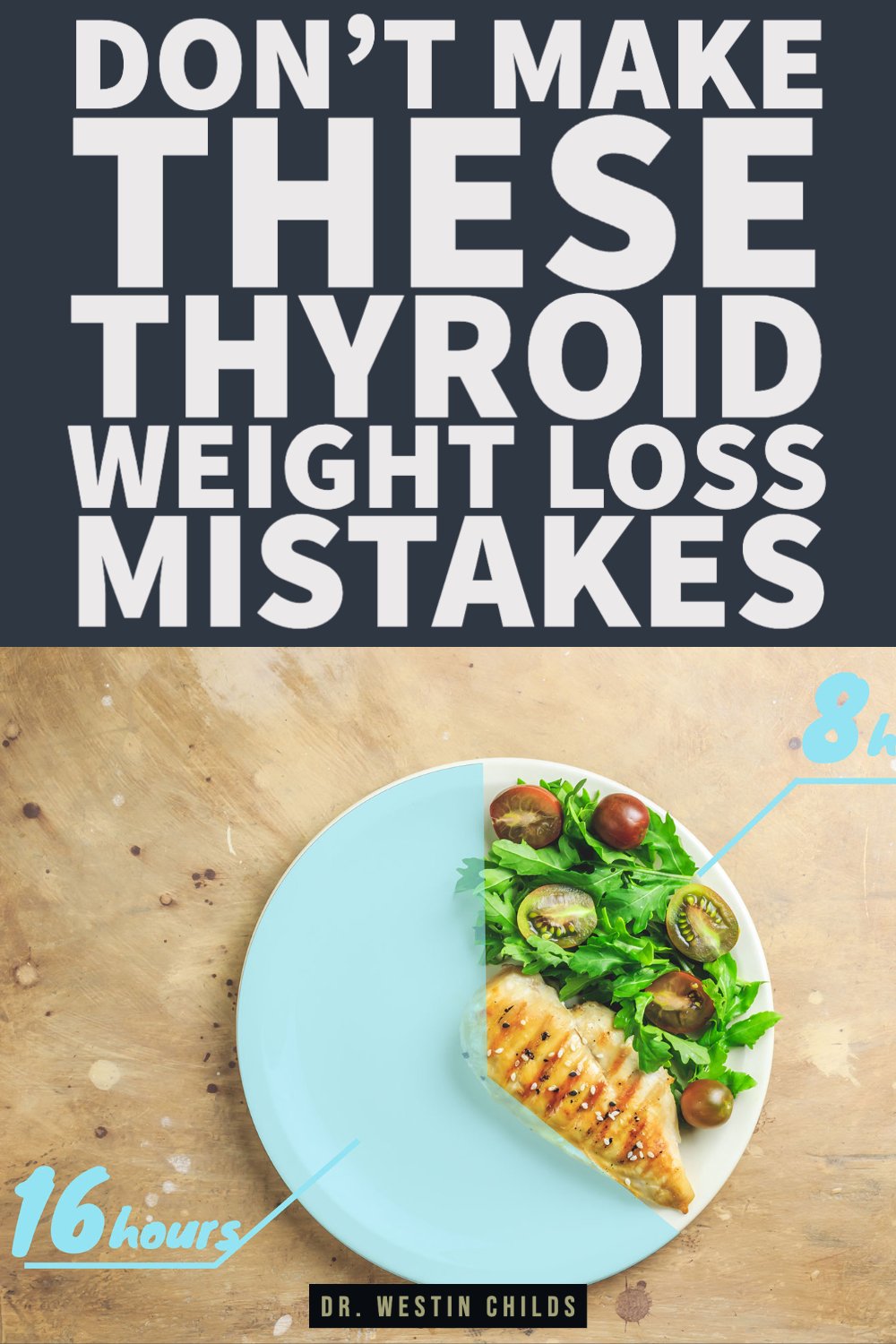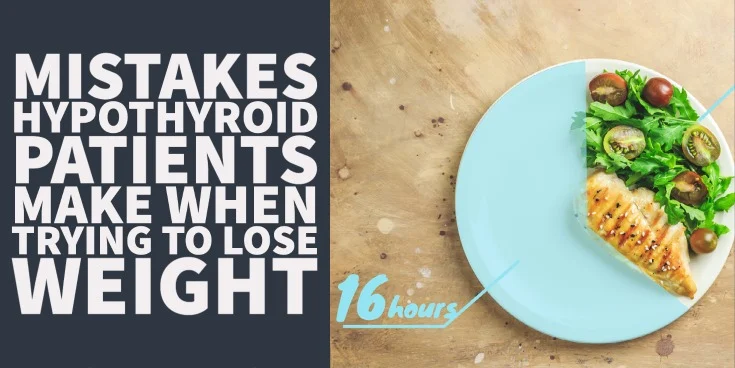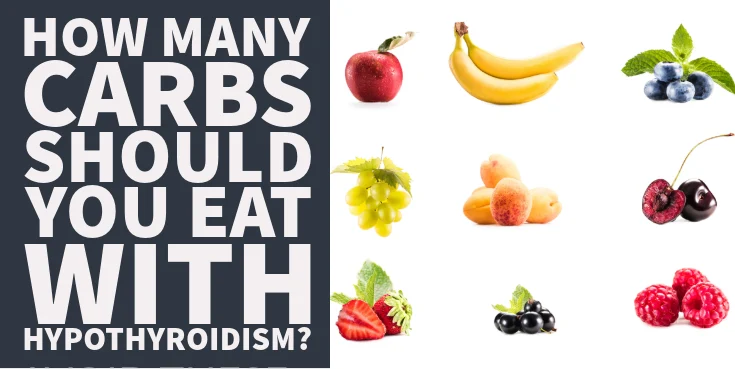Does it feel like your thyroid is making it impossible to lose weight?
While there’s no question that having hypothyroidism makes weight loss more difficult, it is definitely still possible to have this condition and get back to a normal weight.
The key to getting there is all about having the right plan and avoiding pitfalls that can make your thyroid function worse.
And, believe it or not, many of the traditional weight loss strategies that you’ve been taught may be sabotaging your efforts.
With this in mind, let’s talk about mistakes that should 100% be avoided if you have hypothyroidism and if you are trying to lose weight.
Avoiding these will make your weight loss efforts MUCH more effective:
DOWNLOAD FREE RESOURCES
Foods to Avoid if you Have Thyroid Problems:
I’ve found that these 10 foods cause the most problems for thyroid patients. Learn which foods you should avoid if you have thyroid disease of any type.
The Complete List of Thyroid Lab tests:
The list includes optimal ranges, normal ranges, and the complete list of tests you need to diagnose and manage thyroid disease correctly!
#1. Massive Upfront Calorie Restriction
What’s the first thing that people do when trying to lose weight?
They immediately reduce their calories.
This is the foundational treatment of any weight loss regimen and, no matter what, some element of calorie restriction will be necessary if you want to get back to a 100% normal weight.
It just so happens that calorie restriction is a double-edged sword and, if done incorrectly, it can actually make your thyroid worse (1).
I’ve gone on record explaining why calorie restriction is harmful and potentially dangerous for thyroid patients who are trying to lose weight and it should be avoided.
So it may seem confusing now that I’m advocating for it.
Well, that’s only partially true.
There’s a right way to do it and there’s a wrong way to do it, and most people end up doing it the wrong way.
One of the wrong ways to implement calorie restriction is with what I refer to as a massive upfront deficit.
A massive upfront deficit is one that applies negative pressure on thyroid function and lowers your free T3 and raises your reverse T3.
It’s the kind of diet that has you eating 500 to 1,000 calories each day.
This massive drop in your daily calories will have a negative impact on your metabolism and thyroid function which will last for years.
We know this from studies that have tracked contestants of the biggest loser (2).
The reason thyroid patients get lured into these massive upfront deficits is that they are promised a rich reward of rapid weight loss.
What they don’t realize is that while they may lose some weight, their reward will only be long-term metabolic damage and thyroid dysfunction.
Not the reward that any thyroid patient wants.
For most thyroid patients, time should be spent focusing on balancing and improving thyroid function FIRST before any time is spent on calorie restriction.
If you are more than 20 pounds over your ideal body weight then focusing on your thyroid will give you the biggest benefit in terms of weight loss.
If you are within 5 to 10 pounds of your target weight then you will need to pay more attention to your calories but any deficit that exists should come from something like intermittent fasting (a form of intermittent calorie restriction) as opposed to consistent calorie restriction.
The bottom line? Focus on balancing thyroid function FIRST and then move into a scheduled form of intermittent calorie restriction from a fasting program.
#2. No Weight Goal or Plan
If you think you are going to reach your target weight without a long-term weight loss plan or goal then think again (3).
I can tell you from personal experience that the hypothyroid patients who make it to their desired weight have a specific goal and a specific plan in mind to obtain that goal.
And in addition to a plan, they have a purpose that drives them.
What does this look like?
It looks like setting a set duration or timeline, a plan that you will follow during that timeline, and a range, or ideal weight that you’d like to achieve.

I’ll give you two made-up examples and you tell me which hypothyroid patient is more likely to succeed:
The first we’ll call Sally.
Sally thinks it would be nice to lose an extra 15 pounds for the summer and she thinks to herself she’s going to watch what she eats for the next few months.
That’s pretty much her entire plan.
Now compare Sally’s mindset and plan to that of her made-up twin sister who we will call Allie.
This is Allie’s plan:
“For the next 12 weeks, I’m going to stick to a whole-food-based diet, limit my intake of processed foods, sugar, dairy, and gluten, work out 3 to 5 days per week, intermittent fast 3 days per week (Monday, Wednesday, and Friday), weigh myself weekly, take weekly progress pictures, and take my supplements every day first thing in the morning.”
When things get hard she’s going to remember that she wants to lose the weight so she can continue to play with her kids.
Her goal is to lose 15 pounds during this time, but she’s happy even if she loses 5 to 10.
Who do you think is more likely to be successful?
Sally or Allie?
Allie, obviously!
She has a plan, a duration, a goal, and realistic expectations, and she has a plan for more than just her diet.
If you really want to lose weight, be like Allie, not Sally.
#3. Overeating Healthy Foods or “Healthy” Versions of Unhealthy Foods
Most thyroid patients have some idea about the basics when it comes to eating healthy.
There are still people who believe their eating healthy when they aren’t, but for the most part that isn’t a problem nowadays.
But this doesn’t stop people from continuing to make this one big mistake:
They overeat healthy foods, especially “healthy” versions of unhealthy food.
Here’s what I mean:
You already know that brownies, cakes, and cookies are probably not what you should be eating when you are trying to lose weight, right?
They are loaded with processed ingredients, preservatives, coloring additives, sugar, fat, and more.
You know this.
But even though you know this, it still doesn’t stop you from making a paleo-friendly cake or gluten-free brownies, or dairy-free ice cream and the list goes on and on.
These are exactly what I mean by “healthy” versions of unhealthy foods.
If you adjust a recipe to make it paleo, or gluten-free, or dairy-free, it definitely makes the recipe better, but it doesn’t mean that you should be eating it while you are trying to lose weight!
Sure, paleo brownies are better than the box brownies that you’d buy at the grocery store, but both really should be avoided while you’re trying to lose weight.
One of the biggest problems with making this type of food is that it never gives your taste buds time to recalibrate to healthy foods.
If you can avoid hypersweet foods for just 2-3 weeks, your taste buds will become desensitized and you won’t have those cravings for sugary sweets (4).
But if you never let your body adapt because you’re constantly making “healthy” sweets and treats, you’re just making your life that much more difficult.
#4. Not Having Realistic Expectations
This is a BIG one.
I completely understand the desire that hypothyroid patients have when losing weight but you have to be realistic about what type of results you can expect (5).
I don’t even blame you for having these expectations because online advertising and marketing have been trying to convince you for decades that weight loss is easy and rapid.
But that isn’t the case.
You can definitely lose weight and even get to your ideal body weight, but it’s going to take time, effort, energy, and no small amount of commitment.
And weight loss is even slower and more difficult for thyroid patients due to how the thyroid impacts metabolism.
Again, it’s not impossible, but it will be more difficult for you than for someone without a thyroid problem.
So what should you expect as a hypothyroid patient trying to lose weight?
A solid 1 to 1.5 pounds of consistent weight loss each week is a healthy and stable rate.
This means somewhere around 3 to 5 pounds per month.
I know it sounds far more appealing and tempting to follow someone who claims that you can lose 20 pounds in a month, but trust me when I say, it’s not worth it.
You can definitely drop 20 pounds in a month doing aggressive dieting, but your thyroid will pay the consequences.
And most of the 20 pounds that you would lose in a month are from a combination of muscle mass and water weight which means you’re not actually doing any good for your body.
And this leads us to point number 5…
#5. Cutting Carbs Too Quickly
Contrary to popular belief, carbohydrates are not as bad as you might think.
Yes, getting rid of carbohydrates can definitely help you lose weight due to their influence on hormones like insulin and leptin.
But don’t get confused in thinking that you MUST reduce your carbohydrates if you want to lose weight.
There are some groups of people out there who will try to convince you that carbohydrates are the enemy and that they aren’t essential for your health.
And while it’s technically true that there is no such thing as an essential carbohydrate, they are still essential for the proper function of many hormones including thyroid hormones and sex hormones.
This is exactly why we are starting to see low thyroid function and low testosterone in long-term users of the ketogenic diet and the carnivore diet.
This isn’t to say that all carbohydrates are good. I’m not saying that at all.
But if you are eating whole-food sources of carbohydrates such as fruits, vegetables, and moderate amounts of potatoes or rice, you’re going to be ok and you can still lose weight.
One big benefit to eliminating carbohydrates is that doing so tends to be associated with a rapid loss of water weight (6).
This means the scale will move down very rapidly over a short period of time.
You aren’t losing more fat mass during this time, but to see a quick drop on the scale can be both encouraging and discouraging depending on when it happens.
Be careful about a diet that rapidly drops your carbohydrates early on in your weight loss routine.
Doing so is great for a temporary boost in perceived weight loss, but it’s easy to get frustrated when your weight loss appears to stall.
Of course, it isn’t actually stalling, it just doesn’t feel as good to lose 10 pounds in 2 weeks and then 1-2 pounds a week thereafter.
Fruits and vegetables are great for filling up your stomach, providing you with a boost of energy, and providing your body with nutrients, polyphenols, and flavonoids.
As it relates to your thyroid, cutting carbs for a short period of time is usually not a problem, but long-term very low carbohydrate diets may start to affect your T3 levels (7).
So keep that in mind as you pick and choose what type of diet you are going to follow throughout your weight loss journey.
#6. No Resistance Training (You’re Losing Muscle & Fat)
Many thyroid patients will do what I call a tissue loss diet instead of a fat loss diet.
And this is a big problem for both their thyroid health and their overall health.
What is a tissue loss diet?
It’s a diet that results in a combination of fat mass, water weight, and muscle mass.
If you are trying to lose weight, what you’re really trying to do is PRESERVE muscle mass and ONLY lose fat mass (8).
But most thyroid patients who follow standard diet and weight loss advice will end up losing a combination of fat and muscle mass.
And because muscle mass is a very thyroid-responsive tissue, this only ends up hurting their thyroid in the long run.
So how can you lose fat mass while maintaining muscle mass?
It’s easier than you think.
All you need to do is combine your weight loss efforts with sufficient protein intake and with regular strength training.
At minimum, your protein intake should be somewhere between 60 to 100 grams of protein per day and you should plan to do a full body resistance program at least twice per week.
Just doing these two things will help keep your muscle mass while your body drops fat mass.
Unfortunately, it’s a lot more difficult than you might think to track your muscle mass and fat mass.
Standard scales won’t do it, which means you have to be a little more creative.
My recommendation is to use a combination of weekly progress pictures, body measurements, and the scale to help you figure it out.
A good way to tell if you are losing too much muscle mass is just by looking at your face.
Your face may get leaner as you lose weight but it should always look healthy.
If you start to look sickly or gaunt or your hair starts to fall out, that’s a sign that your weight loss routine is doing more harm than good.
#7. Obsessing Over Your Health & Weight
As someone who has been helping thyroid patients for 8 years, this is something that I see all of the time.
Thyroid patients who are trying to lose weight fall into 3 categories:
The first is the kind of person who is only partially interested in weight loss like our example of Sally above.
Next, you have the person who becomes obsessed with their weight and health to the point that they can almost find fault or problems with every single treatment or therapy.
And third, you have the person who finds a balance between being interested in their weight loss journey but not to the extent that it consumes their entire life.
For long-term success, you want to be the third person.
It may seem like obsessing over your health and weight is the ideal place to be but it’s not.
This type of person is constantly reading, researching, and evaluating how they are feeling (sometimes hour to hour or day to day) to the point that it becomes difficult pathologic (9).
Yes, it’s important to keep track of these measures and factors, but they shouldn’t consume you.
If you get too consumed with your results by trying to assess your weight every single day, you will lose the forest for the trees.
It’s perfectly normal for you to have some ups and downs during your weight loss journey and this doesn’t mean that what you are doing isn’t working or should be changed.
Trust the process, stay consistent, and plan to be in it for the long run.
#8. Failing to Have a Maintenance Strategy
Unfortunately, this mistake is not seen as often as some of the others I’ve listed simply because so few thyroid patients make it to their desired weight!
But that doesn’t mean we shouldn’t discuss it.
Along with having a plan for reaching your target weight goal is a plan that should include what I call your maintenance strategy.
Your maintenance strategy is just the plan that you execute once you reach your target weight so that you can stay there and not experience rebound weight gain.
The reason this is so important is because the act of weight loss has a big impact on your hormones.
And it puts them in a position where they are hyper-activated with one goal in mind:
To make you regain the weight you just lost.
You can prevent this rebound weight gain from occurring, but it will require that you slowly get back to a normal lifestyle and way of living over several months.
In general, your maintenance phase should last around two-thirds as long as your weight loss journey took.
So if you were losing weight for a 3-month period, you should plan to have a maintenance period of 2 months.
This means that for every 3 months of active weight loss, you will have 2 months of maintenance to allow your body, thyroid, and metabolism to recalibrate to your new weight.
This may seem like a lot of time, but it’s not when you consider that if you lose weight the right way, it won’t come back (unless you make the same mistakes you made that caused you to gain weight in the first place!).
When it comes to losing weight with hypothyroidism, there’s a wrong way and a right way to do it.
If you need more help in figuring out your next steps, I would recommend checking out this article next.
It’s a 6-step guide designed to help you lose that hypothyroid weight and keep it off.
Now I want to hear from you:
Do you have hypothyroidism and are you trying to lose weight?
Have you had success in losing weight? Why or why not?
Are you guilty of making any of the mistakes mentioned here?
Are you planning to make any changes to how you lose weight after reading this?
Leave your questions or comments below!
Scientific References
#1. ncbi.nlm.nih.gov/pmc/articles/PMC2649744/
#2. pubmed.ncbi.nlm.nih.gov/27136388/
#3. ncbi.nlm.nih.gov/pmc/articles/PMC5111772/
#4. ncbi.nlm.nih.gov/pmc/articles/PMC4500487/
#5. ncbi.nlm.nih.gov/pmc/articles/PMC6091442/
#6. pubmed.ncbi.nlm.nih.gov/7332312/
#7. ncbi.nlm.nih.gov/pmc/articles/PMC9165850/
#8. ncbi.nlm.nih.gov/pmc/articles/PMC5421125/
#9. ncbi.nlm.nih.gov/pmc/articles/PMC6370446/









